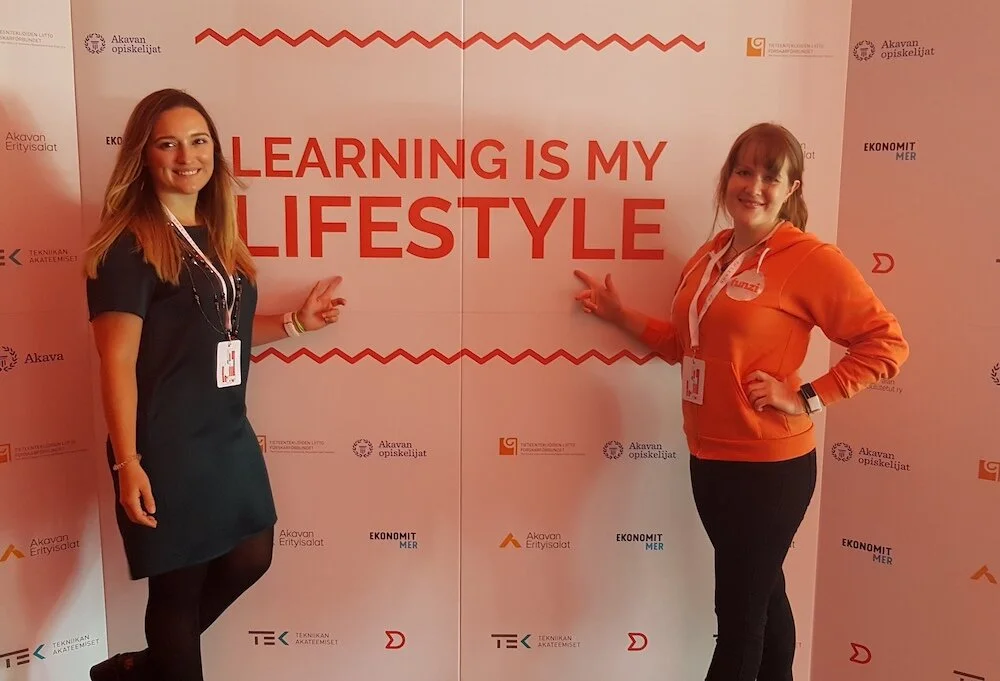Dare to learn and develop
Hello! I’m Melissa, the lead content specialist at Funzi! In between helping our clients Funzify (what we call it when we apply our mobile pedagogy) and launch engaging mobile courses, I’m always on the lookout for new ways to develop professionally!
As a young professional in the education industry, dare I say I have a lot to learn!
And that’s what attracted me to take part in the Dare to Learn event. Dare to Learn dubs itself “the festival for rethinking learning”, and the goal of the event is to bring together learning enthusiasts to explore themes in lifelong learning. I’m really excited to share with you what I’ve learned at the event, and I also hope that doing so will inspire others to share and apply their own findings in educational environments all around the world!
I had two main goals for the Dare to Learn event:
Gather expertise on a variety of new pedagogical approaches
Map out the skills needed most for our learners to develop personally and professionally
What really stood out during the event was the special focus on the role of emotions in learning environments.
In a fireside chat, postdoctoral researchers from the University of Helsinki Laura Riuttanen and Panu Pihkala talked about how we can utilize emotions in learning environments, especially to address difficult topics such as climate change. They said that when it comes to teaching climate change, the main issue is not that we are lacking new or credible information, rather, we are lacking an emotional approach in pedagogy. They discussed the need for teachers to be more emotionally open with their students. Being honest and having a personal connection with the topic as a teacher is the best way to help students understand and build empathy. Especially for topics that lead to feelings such as loss and grief.
Empathy plays an important role in learning because it allows the learner to be aware of how others feel, which can result in collaborative solutions for challenges in the learning environment, as well as in the real world. If we deter teachers and students from expressing emotions in attempts to “keep the peace”, learning outcomes will be compromised.
Similar sentiments were expressed in other talks throughout the event. We were reminded that before the printing press was invented, and before we had access to all the world’s knowledge thanks to the Internet, we relied on direct communication for learning. Emotions are common in all interactive environments, especially in education. One thing many of the event speakers seemed to agree on is when it comes to education, trial and error play a very important role in reaching learning outcomes.
We should empower learners by encouraging real-life experiences, emotions and all.
When we consider the role emotions play in practical learning, trying something new can trigger feelings of excitement and curiosity, while making an error can trigger feelings of frustration and disappointment. All of these emotions are equally important in achieving learning outcomes! Emotions will always present themselves in situations of uncertainty, but we can use emotional awareness to our advantage, and coach our learners towards the development of empathy, a growth mindset, and lifelong learning.
Much of what was mentioned at Dare to Learn seemed very familiar, yet so far away in terms of putting valuable knowledge into practice. The Finnish Minister of Education, Sanni Grahn-Laasonen, reminded us that even though we are advancing rapidly in research and technology, there are still strides to be taken to achieve equality in education.
Children today face a future where they could have dozens of jobs in their lifetime in as many as ten different careers. Yet at the moment, around 50 % of the world's children do not possess core skills in math, reading, and writing. In a world where learning content is more available than ever before, doesn’t that sound unfair? It’s something we’ve known for a long time at Funzi: the world is changing rapidly, but we are not addressing existing obstacles fast enough.
“I believe that in order for us to fully empower learners, we need to focus on making education more inclusive and accessible in the present.”
One very important area we focus on at Funzi is how to deliver learning to those in turbulent situations. Skills training is crucial for refugees and immigrants of all ages as they adapt to changing surroundings. Unfortunately, people who suddenly find themselves in turbulent situations often lack the ability to take part in traditional classroom-style learning or have limited access to high-speed Internet and cutting-edge technology. That’s where light-weight and easily accessible mobile learning comes in handy! But to use these tools to their fullest potential, it’s also important for us to know which skills are the most relevant to our learners. Sahra-Josephine Hjorth, CEO of CanopyLab, believes that we should put more focus on delivering life skills, self-healing, overall wellbeing, and entrepreneurship to refugees. And we couldn’t agree more!
The distribution of education is not the only obstacle we face in delivering skills-based learning to those in turbulent situations. There is often also an absence of growth mindset. Kirsi Tirri, a professor of education at the University of Helsinki, has noticed an alarming trend of decreased growth mindset amongst immigrant students in her research. Her advice for supporting a growth mindset in learning environments is to keep expectations high, and the learning environment warm and honest. She remarked that there is power in not giving in when a learner becomes discouraged. We should encourage the learner by saying “I can see you have practiced, but you are not quite there yet. Keep practicing and you will achieve it” as opposed to “I can see you have practiced, and that’s good enough.”
Plus, supporting the growth mindset of learners has a very valuable outcome: it supports lifelong learning!
Pär Lager, Senior business advisor of Academy, shared some really great examples of how lifelong learning helps boost employability and professional development, while also accelerating economic growth. With new tools and practices being developed regularly, we need to address the skills gap by re-skilling and up-skilling youth and adults. For example, the government of Singapore sponsors a program called Skillsfuture, which aims to provide all Singaporeans with equal opportunities to up-skill and re-skill. This not only makes a huge impact on the lives of learners, but it also supports Singapore's next phase of economic development and efforts to become an inclusive society!
I feel that we as education professionals do a lot of looking back and a lot of looking forward, while many of the most pressing matters are still at hand.
Though it’s wonderful to see how new advancements will be used in the classrooms of tomorrow, my mind can’t seem to stray from the millions of youth and adults that have already missed out on educational advances, yet need to learn new skills to equally access high-quality and high-paying jobs. In my opinion, the solution is not to ask people in these situations to sit through years-long study programs or expensive boot camps, rather, to work on providing them with access to high-quality education at little or no cost. In the case of Singapore, we can see how beneficial that is for us all! To accomplish this, we need solutions that can scale to areas where technologies such as HD media streaming, AI, and VR are not yet supported.
Thankfully, here at Funzi, that’s what we’re all about! It’s very inspiring to be a part of a team that’s both eager and well-equipped to take on these challenges, and we do so every day. My experience at Dare to Learn has reminded me why my work is so important and has definitely fueled my passion to keep on learning and developing as a professional!
Melissa Alasalmi
Software engineer and content specialist


